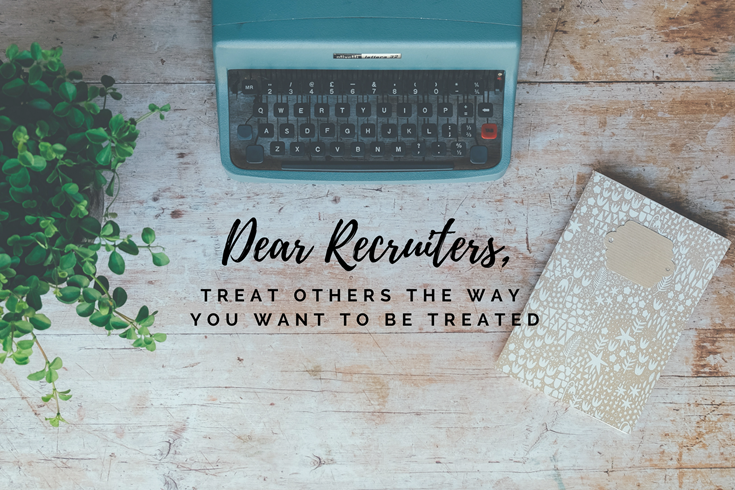|
|
An Open Letter to Hiring Managers
Dear hiring managers and recruiters,
I know your job is tough.
I know how many hundreds and even thousands of resumes you have to look through and the pressures you face in finding the right candidate for the job.
And I know the things job seekers do that annoy you (those things sometimes annoy me too).
It’s why I coach my clients on how to strike a balance between helping you see how their qualifications fit the job and not pestering you to death.
I want to help them help make your job easier.
But, I also have to come to my clients’ defense on a few things.
The etiquette and courtesy you expect from job seekers…the etiquette I teach them in order to meet your expectations…should be reciprocated.
My story.
Before I go any further, let me first tell you a story.
I remember it like it was yesterday. Twelve years ago I interviewed for two different career services jobs in two different departments on the campus of a very prestigious southern university.
While both interviews were on the same campus, my experiences were as different as night and day.
In my first interview, the search committee chair picked me up from my hotel and took me to breakfast.
After breakfast she took me to the office where all the staff greeted me warmly. Everyone showed a genuine interest in my skills and my portfolio during my interview.
After my interview, several other staff members escorted me to the University Club for a very elegant lunch.
I was honest and upfront with the director who was making the hiring decision. I told her I had another interview scheduled with another department on campus the following week.
A few days later, I got a call from the director saying she wanted to meet with me as soon as I was back in town for my other interview.
I told her I could come by her office as soon as I was done with the following week’s interview.
She gave me her personal cell phone number and asked me to call her as soon as I was finished with the interview.
I arrived the following week for my interview for the other job.
This time, I was told I needed to walk from my hotel to this department’s office. That didn’t seem like a problem since it was only a couple of blocks away, until I stepped outside into a southern sauna.
When I arrived for my interview, the receptionist offered me some coffee. Instead I chose water because of the heat from the walk.
This was around 8am.
Finally, around 1pm, when my interview with about the 5th person in the office was starting, I asked if I could have a minute to use the restroom (because I had not been offered a break at all yet during the interview process).
She was very kind and said to me, “You probably haven’t had lunch yet either, have you?”
“No ma’am,” I replied.
She rolled her eyes and started sifting through her purse. She must’ve been a mom because she pulled out a granola bar to give to me, and said, “ They did the same thing to me when I interviewed here!”
As I was leaving the second interview, the hiring manager for this job said, “Thanks for coming,” and shut the door in my face.
I’ve never had an interview end that abruptly before. I was starting to think they didn’t want me.
And I knew from that experience, I didn’t want them!
As promised, after my second interview, I called the hiring manager from my first interview to let her know I was done and that I would soon head toward her office across campus.
But first I asked her if I could have about 30 minutes to grab something to eat before coming over. I was so hungry since it was already about 2pm and I still hadn’t had any lunch.
Her response: “You mean they didn’t feed you?”
Me: “No ma’am.”
Her: “You stay right where you are. I’m coming to pick you up and take you to lunch.”
She picked me up and took me to one of the swankiest restaurants in town.
And she offered me the job.
Believe it or not, I also got an offer for the other job, for the same amount of money.
Can you guess which offer I took???
Do Unto Others As You’d Have Done To You
With the unemployment rate at an all time low right now (3.9%), hiring managers can’t afford to turn off any well-qualified prospects.
Yet, I see it happening all the time. I hear it directly from my clients.
My clients do all the right things I teach them to do. The things every job seeker is expected to do in the job search, like showing up for interviews on time, sending thank you notes afterwards, etc.
But (in general), they’re not treated with the same respect.
So my plea to you, the recruiters and hiring managers, is to consider practicing the following five common courtesies. They are simple and easy to do.
And I guarantee, by extending these courtesies, you’ll land the best talent who will show the same courtesy to your customers and your clients.
5 Common Courtesies for Recruiters and Hiring Managers
1. Be clear, specific, and realistic in the job description.
One of the complaints many hiring managers have is candidates not fully reading the job description before applying for the job. That is frustrating, I’m sure.
But often times, hiring managers post job descriptions without having read them either.
Are you really taking the time to see if the description sounds too vague? Does it accurately describe what’s expected of the person in this role?
Did you just copy and paste it from a past job ad? Or did you just ask HR to write it for you without telling them what you really want?
One of the complaints most candidates have is that many of the hundreds of job ads they have to sift through are extremely vague.
Also, be realistic about what you’re looking for.
You can’t expect to find an adequate pool of candidates who check off each and every box. Especially if you’ve gone overboard on your list of requirements.
You’re not going to find a unicorn!
But it is likely you’ll find some high-quality candidates who have the majority of the skills and requirements you’re seeking, and who can also be easily trained in the areas where they’re lacking.
Be open to such candidates. This will save you time in the long run so you wont’ have to go back through your list of candidates you originally dismissed.
2. Be on time for the interview.
You obviously expect candidates to show up on time (if not early) for their interviews. It would make for a very bad impression if they didn’t.
You also don’t want to make a bad impression. Don’t keep candidates waiting. They’re already nervous. Having to sit and wait for you is just going to make them more nervous.
And it could possibly make them late for any other interviews they have lined up after yours.
Be mindful and respectful of their time.
3. Be honest in answering questions.
The interview should always be a two-way street.
When giving candidates the time to ask questions of their own, be as honest as you can in your responses, just like you want and expect them to be with their answers to your questions.
This may sound obvious. But I personally have been in interviews where I asked some tough questions about turnover and I was given vague or politically correct but dishonest answers.
Remember, candidates do their homework.
They read the reviews on Glassdoor.com.
And they have connections of their own who know what’s really going on in your company and aren’t afraid to tell them the truth.
Consider how it will make you and your company look when candidates compare notes with their contacts.
4. Don’t abuse the process.
I always tell my clients it’s unethical to interview for a job they have no intentions of taking just to get the interview practice.
It’s also unethical for a company to interview candidates and have them pitch ideas with no intentions of hiring them, just to collect their ideas.
Years ago, I had a day-long interview where in one part of the afternoon I was given 45 minutes and certain parameters to come up with an idea for a new program that could be implemented throughout the organization.
I then had to pitch my idea along with details on how to implement it.
I didn’t get the job, and later found out that no one got the job.
It made all of us candidates wonder if the company held interviews just to get ideas without having to pay a salary for them.
This can and has happened before, which is a very unethical practice.
I always tell my clients if they sense this is what’s happening in an interview, consider it a red flag!
5. Follow up.
I teach my clients to always follow up their interviews with a thank you note to each and every person they interviewed with, even if it was with 15 different people.
I’m sure many recruiters and hiring managers appreciate this gesture and take it into consideration when deciding on who to hire.
So, please, for the sanity of the poor souls who have:
a.) gone through a cumbersome online application system,
b.) taken the time to research your company,
c.) spent time interviewing with you, and
d.) written numerous thank you notes to all of the interviewers,
…let them know if they didn’t get the job.
You don’t have to notify everyone who applied for the job. Just the 3–5 people you interviewed. You don’t even have to tell them why you didn’t select them.
Just LET THEM KNOW.
It breaks my heart to see clients’ hope slipping away along with their confidence as each day passes without hearing anything at all from the company they put so much time and energy into their interview process.
It’s just plain rude to spend that amount of time with a candidate getting to know so much about them to then never hear from you.
Recruiters and hiring managers say they want candidates to come in to an interview with confidence. But when the above scenario occurs over and over, how can you expect them to maintain their confidence?
Trust me. It’s much better for them to know they didn’t get the job than to know nothing at all and to keep replaying in their minds what they might have said or done wrong.
Please, help them move on with a simple “yes” or “no” email. That’s all it takes.
Remember, you were once on the other side of the desk.
So do unto your candidates as you’d have done to you if you were in their shoes…which you may be someday again in your own career.
Related Post: Did You Get Ghosted After Your Interview? What to Do Now






